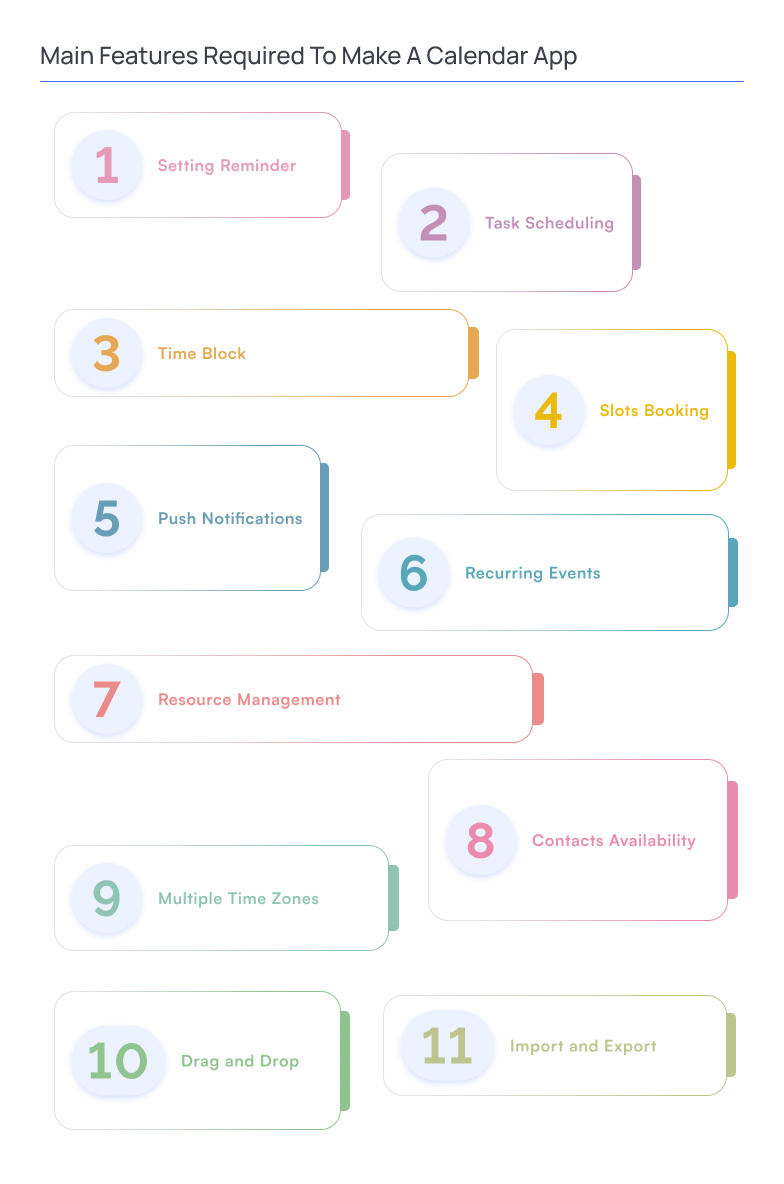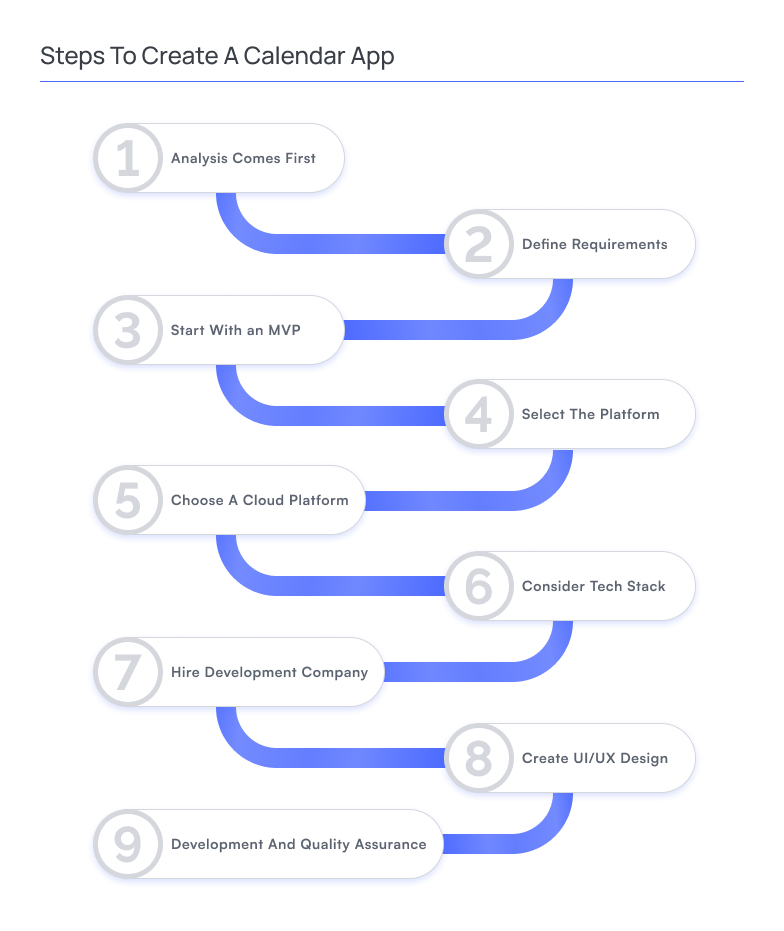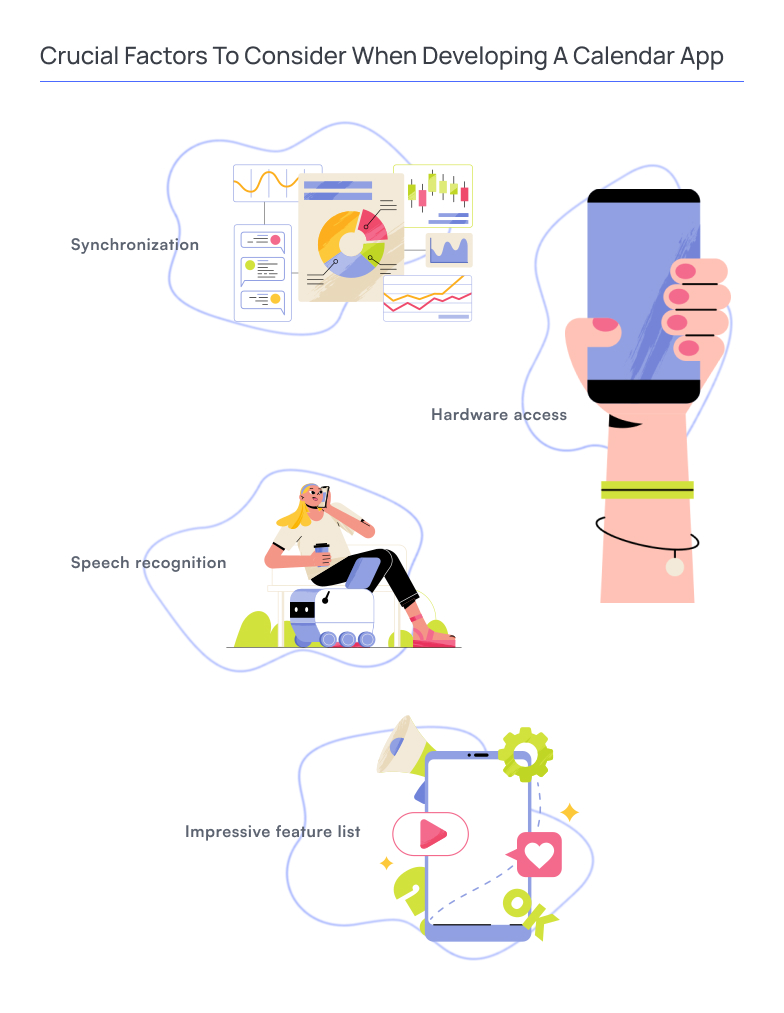Nowadays, we must be mobile enough to do everything we planned. Many people may have multiple tasks that have to be done during the day.
Sometimes all these tasks are essential and can be seen to be a disaster if you forget about something.
However, modern technologies can help us follow our schedule without missing deadlines and events.
Calendar apps are already widespread and used by many people. They help with many daily tasks so we can plan everything properly throughout the day. Although plenty of available solutions are in the market, you can make your own calendar app from scratch with new design and features.
This business idea can be beneficial, and we will reveal more tips here.
What Businesses Require Calendar App Development?
First of all, let’s identify the industry that requires a calendar app the most. If one of the listed industries is yours, then you definitely need a calendar app that fits your niche.
Logistics
Nearly all process aspects must be scheduled in advance in the logistics industry. For example, Uber Freight contains an in-app calendar with which shippers can check their past and future shipments and select a date and time for delivery.
Education
Online education is widespread in the modern age. Education platforms are integrating calendars into their systems to make them more feasible. An online calendar is accessed differently for scheduling home tasks, lectures, and Q&A sessions. In addition, in-app calendars send reminders to users if there is an upcoming online class or deadline to submit an essay.
Furthermore, we have an article that describes how to create an eLearning platform, so we recommend you get into it.
Parking And Transportation
A parking app allows users to book the time and date for parking using the in-app calendar.
Moreover, an Uber-like taxi delivery model is prevalent today. Users can schedule their rides, and the app will send a reminder when their driver arrives.
Healthcare
The healthcare industry uses in-app calendars for various purposes, such as tracking medicine intake timings, booking appointments with doctors, etc. The calendar can also be used to track physical activities like running or biking to gather statistics at a specific time. This information can then be used to plan training sessions.
Streaming apps
Streaming apps also use in-app calendars to schedule regular broadcasts and chat shows, live interviews, one-time presentations, and other events. For example, Amazon Prime and Netflix allow users to register for the premier calendar to avoid missing their favorite TV series or shows.
Travel and Hospitality
Travel and booking platforms actively use in-app calendars to provide their services. The calendar displays available dates and the booked dates for flight reservations, allowing users to view all their reservations in one place.
Social media
Popular social media platforms like Facebook have integrated calendars that help users stay updated about all events, whether they are conferences, meetings, or concerts. Also, messenger like Telegram has a scheduling feature so that users can schedule a message for a specific time.
By the way, if you want to know all the tricks on how to create a social media app, read our detailed article.
Main Features Required To Make A Calendar App
Thus, if you decide to create a calendar web application or mobile app, you must understand what features your calendar app should include.

Setting Reminder
A reminder feature should be integrated into the app that sends notifications to the user before their scheduled events or appointments occur. This feature helps users avoid missing important events.
Task Scheduling
The user can schedule tasks in the calendar and mark them as complete when they are finished. This significantly saves time because there is no need to check the event status constantly.
Time Block
The Time Block feature allows users to block off time in the calendar visible to others, so no one can disturb them while they work on a task. This feature increases work efficiency by allowing users to focus on tasks without distractions.
Slots Booking
This feature is created for people who work online for a limited time, such as freelancers and other entrepreneurs. Booking a few specific slots and making them available for other users is possible. Also, this feature is helpful for professionals, such as doctors, therapists, tutors, or hairdressers, who must schedule client appointments.
Push notifications
Also, when you create your own calendar app, you must enable a push notification feature. Push notifications in a calendar app are a helpful feature that allows users to receive alerts and reminders about upcoming events and tasks. With push notifications, users can stay updated on their schedules and avoid missing necessary appointments or deadlines.
Recurring Events
A recurring events feature in a calendar app allows users to create events that repeat regularly, such as daily, weekly, monthly, or yearly. This feature saves users time by eliminating the need to make similar events multiple times manually.
Resource Management
The app’s calendar feature allows users to add all essential resources so that they can be allocated and streamlined later to the required booking slots. This feature helps avoid confusion and task repetition despite the number of employees or users registered in the system.
Contacts Availability
With this feature, the user can view the availability status of their contacts by checking their calendar data. For example, if a contact has marked a time slot as busy, the user will know that the contact is unavailable. Similarly, if a contact has marked a time slot as available, the user will know that the contact is free. This feature helps users to find a suitable time for a meeting or event that works for all attendees.
Multiple Time Zones
A multiple time zone feature in a calendar app allows users to view and schedule events in different time zones. This feature is helpful for users who travel frequently, work with clients or colleagues in different time zones, or have family and friends in other parts of the world.
Drag and drop
This feature is pretty simple. Using the drag-and-drop feature, you can quickly move events from different columns and groups using the drag-and-drop feature.
Import and Export
Many calendar apps that let you import and export from other calendars also let you subscribe to specific calendars. If you want to know what your coworkers have coming up, subscribe to their calendars so you’ll receive alerts about their events. Even events from calendars you subscribe to can be imported and exported. Just import the calendars as files; you’ll receive alerts about their events.
Build your calendar app together with Binerals
contact us right away!Steps To Create A Calendar App
It is only possible to start something with a detailed plan. Therefore, we provide you with steps you should know about when starting a calendar app development.

Analysis Comes First
Market analysis is essential before starting software development because it helps ensure that the product being developed is viable and meets the needs of its intended audience. In addition, market analysis helps identify potential customers’ needs and preferences, which can be used to tailor the software product to meet those needs.
Also, you can identify existing competitors and their products, which can then be used to differentiate the software product being developed and provide a competitive advantage.
Define Requirements
Your next step is defining the work scope and future project requirements. The process is challenging, but at Binerals, our business analysts may help you build the right approach to calendar app development, choose the proper strategy, and conduct a risk analysis. Thus, it may ensure that your project will be relevant to the market.
Start With an MVP
Starting with a Minimum Viable Product (MVP) is a popular approach to software development. First, you can validate the idea – an MVP can help validate the core idea behind the software product by testing it in the market and getting user feedback. This allows developers to confirm whether the product solves a real problem or meets a genuine need.
Also, MVP enables development cost reduction. Developing an MVP focuses on building only the essential features required to test the product’s viability, which reduces development costs and allows for more efficient use of resources.
By starting with an MVP, developers can minimize the risk of investing time and money into a product that may not be successful in the market. This approach allows them to test the market before committing to a full-scale development project.
Select The Platform
You need to select a mobile platform for which the app will be created. It can be iOS or Android, or both. Everything depends on your budget and expectations.
Developing two native apps for different operating systems is a more expensive and time-consuming process, so it is better to focus on cross-platform app development – the app will function both on Android and iOS. Still, it will be cheaper than a native app, and it will fulfill almost all necessary tasks. Binerals is a specialist in cross-platform app development, so let’s do it.
Choose A Cloud Platform
Several cloud computing platforms can be used for software development, each with strengths and weaknesses. Amazon Web Services (AWS) is a popular cloud platform that offers a wide range of services for software development, including computing power, storage, databases, and developer tools. AWS has a robust set of APIs and SDKs, making integrating with other tools and services accessible.
Also, there are two other popular platforms – Microsoft Azure and Google Cloud Platform. Azure is especially popular among Windows developers, integrating seamlessly with the Microsoft development stack. Google Cloud Platform is known for its strong AI and machine learning capabilities, making it a popular choice for data-driven applications.
Consider Tech Stack
If you develop a calendar application for every platform separately, then the Android app is built using Java or Kotlin language, iOS app – using Swift or Objective-C language. Also, the tech stack may include SQL and/or NoSQL databases like MySQL/PostgreSQL and MongoDB accordingly. However, the next section will cover more details about the tech stack for calendar app development.
Hire Development Company
You need to find a full-cycle software development company that may create your calendar app from scratch. Such development companies should include UI/UX designers, mobile app developers, QA engineers, and DevOps specialists. Binerals is the company that can build your app from A to Z, then release and maintain it.
Create UI/UX Design
UI (user interface) design focuses on the visual and interactive elements of the product, such as layout, color, typography, and buttons. In contrast, UX (user experience) design focuses on the user’s overall experience, including ease of use, navigation, and accessibility. Well-thought-out UI/UX design is essential since the design is the first thing users pay attention to.
Development And Quality Assurance
Developers start working on your app, considering all its technical requirements and characteristics. Once the development is over, the product should be tested by QA engineers. Software quality assurance is the process of monitoring and evaluating the software development process to ensure that it meets the expected quality standards. The main goal of QA is to identify and prevent defects, errors, and other issues that can affect software products’ functionality, reliability, and usability.
After thorough quality assurance, the calendar app may be released. You can monitor key performance metrics and user feedback to upgrade your app in the future.
A Potential Tech Stack For Calendar App Creation
You also need relevant APIs and libraries besides programming languages and databases for calendar app development. For example, Google and Apple have tools for integrating into a calendar app:
Apple EventKit. The EventKit framework provides a set of APIs that allow developers to access the user’s calendar and reminder data stored in the built-in Calendar and Reminders apps on Apple devices. Developers can use this data to display event information, create new events and reminders, and manage the user’s calendar and reminder settings.
Google Calendar API. The Google Calendar API is a powerful tool for developers that allows them to integrate Google Calendar data and functionality into their applications. It is a RESTful API that provides many endpoints for creating, reading, updating, and deleting calendar events and managing calendar resources such as calendars, attendees, and notifications.
With the Google Calendar API, developers can build applications that leverage the full power of Google Calendar, including features like recurring events, reminders, and event invitations. The API also supports time zones, so developers can ensure their applications work seamlessly across different regions and time zones.
In addition, other calendar APIs can enhance your app. FX Calendar API (provides information regarding future finance events), SuperSaaS API (allows sending reminders and enables online scheduling), and Calendarific API (includes access to a comprehensive database of worldwide holidays and observances).
Android app developers may use libraries like Event Calendar, SlyCalendarView, Cosmo Calendar, etc. iOS app development may require using such libraries like CalendarLib, CalendarKit, and JTAppleCalendar.
Crucial Factors To Consider When Developing A Calendar App
Do you want your app to be outstanding among existing competitors? Then you should consider some essential types to make your calendar app more attractive.

- Synchronization. Sync capabilities refer to the ability of an application or service to synchronize data between multiple devices or platforms. With sync capabilities, users can access the same data on multiple devices and have their changes automatically reflected across all devices. This provides a seamless and consistent user experience, regardless of their device. Therefore, your calendar app should be integrated easily across all other devices.
- Hardware access. Your calendar app will become fascinating if it also uses hardware features. For example, your app can use Force Touch or 3D Touch, or other security features to boost the overall security level of your calendar app.
- Speech recognition. Speech recognition in a calendar app can provide several benefits, including improved accessibility for users with disabilities, increased productivity for busy users, and a more intuitive and natural user interface. However, ensuring the speech recognition technology is accurate and reliable is crucial, as incorrect or misunderstood voice commands could lead to errors or confusion in the user’s calendar.
- Impressive feature list. Building a calendar app with the MVP features is the right step when you want to validate the app, but later you will need to add more unique features to make your app different from existing solutions. If you make a clone of any existing competitor, the app’s value will be worthless.
Conclusion
Developing a calendar app can be a complex task. Still, with the right tools and techniques, it is possible to create a powerful and user-friendly application that meets the needs of your users.
Some key considerations when developing a calendar app include choosing the right platform and programming language, designing an intuitive and attractive user interface, integrating with relevant APIs and services, and providing unique and crucial features.
A calendar app can be a valuable tool for users who need to manage their schedules, keep track of appointments and events, and collaborate with others on shared calendars.
By leveraging modern technologies like machine learning, speech recognition, and cloud-based storage and synchronization, skilled developers can create powerful and easy-to-use calendar apps, helping users stay organized and productive.
You can find an experienced development team at Binerals company. We will create your software considering all your requirements because we value our reputation.
Let us make your project!
Hire Binerals